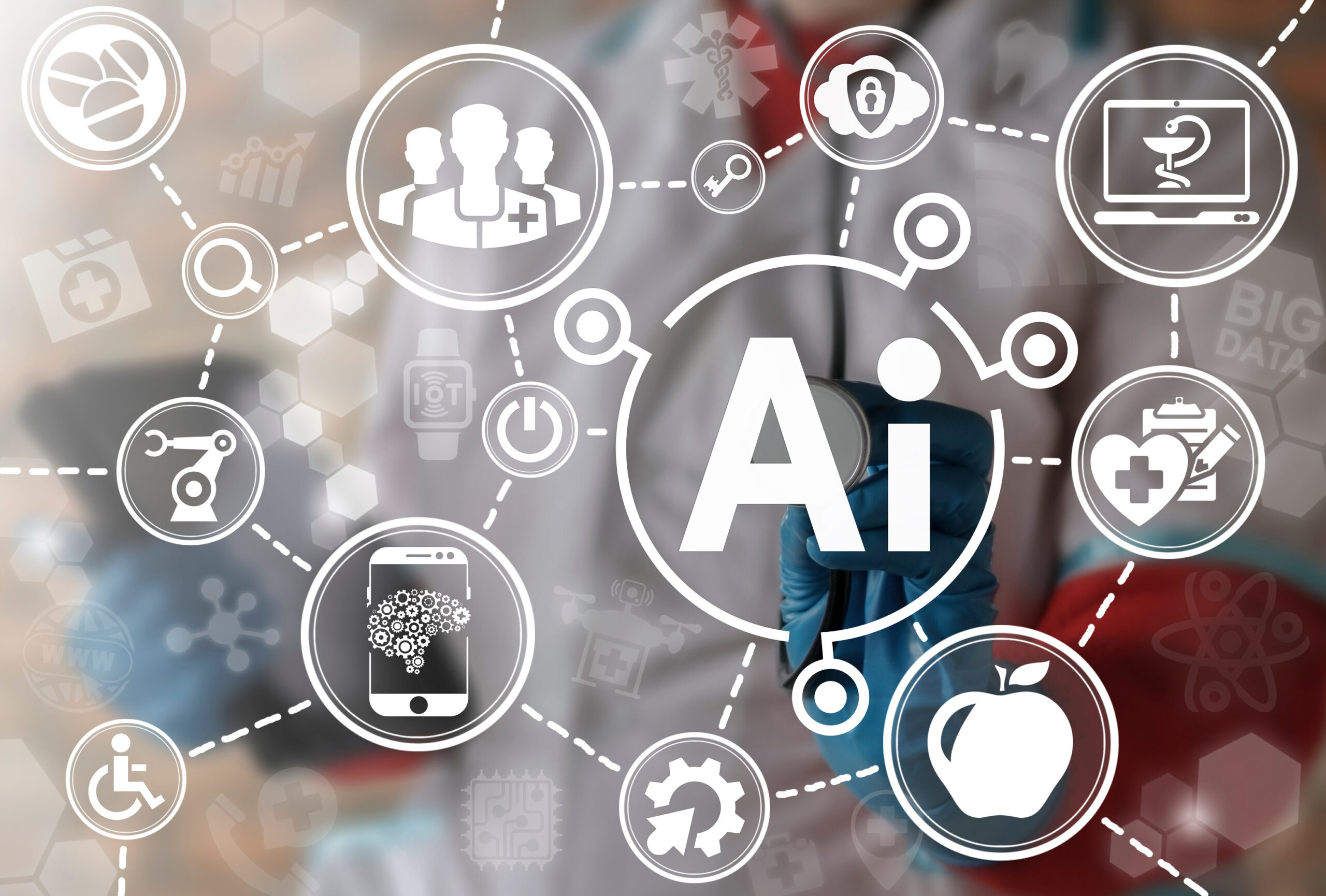The healthcare profession operates under an audacious goal: to help people overcome the natural limitations of being human. By studying symptoms and poring over statistics, providers and payors have learned how to treat injuries, cure infectious diseases, address congenital ailments, and promote wellness so people live longer and healthier lives.
But there’s been an upper limit to what care professionals can do in their current state.
Workforce shortages threaten to curtail the quality and availability of care. Administrative burden diverts the clinicians from patient interactions. Economic pressures strain both healthcare providers and payers, elevating costs and hindering services for customers.
That’s why using artificial intelligence in healthcare is such a game changer. From LLMs and generative AI to virtual assistants and AI agents, the range of AI-based capabilities is reaching into every facet of the healthcare industry.
Most importantly, it augments healthcare professionals so they can enhance diagnoses, streamline operations, offload administrative tasks, and focus on what’s important: giving people the highest quality care. Here are some AI use cases to pursue and why you can’t wait to unlock their full potential.
Medical Diagnoses
Doctors and nurses are all too aware of the depth of knowledge and the nuanced eye needed for an accurate diagnosis. Experts use their training and clinical experience to narrow their analysis as they review patient intake forms, responses to iterative questioning, and testing results. Even then, the intersection of treatment history, prescriptions, genetic predispositions, and other factors can complicate the assessment.
Though still maturing, artificial intelligence in healthcare diagnoses is showing some promising results with certain conditions. For example, AI is exceptional at reviewing medical imaging. This technology can detect subtle patterns or anomalies that might be overlooked by the naked eye, drastically reducing the risk of misdiagnosis.
One early AI use case in healthcare involved IBM’s Watson supercomputer reviewing radiology diagnoses, and now two-thirds of radiology departments use AI in some capacity. As a result, AI has made a life-saving difference in the treatment of breast cancer, lung cancer, cardiovascular disease, and other ailments.
For now, meta-analysis studies indicate that AI diagnostic tools perform comparable to the average physician, but significantly underperforms compared to expert-level physicians. However, that can change as new capabilities, especially AI agents sweep across the market.
Microsoft published a paper about Sequential Diagnosis Benchmark (SDBench), which uses an MAI Diagnostic Orchestrator to coordinate AI agents to increase diagnostic performance. The tool is designed to mimic the iterative questioning style physicians use to diagnose patients while also calculating the simulated financial costs of tests ordered. Each AI agent handles different aspects of the process (diagnosis, information dissemination, and clinical rating) to train the tool to fine-tune performance for accuracy and cost.
Though the early results are promising, there are limitations to tools like SDBench. Patients often reveal what’s really wrong in roundabout or indirect explanations and these models require several concise sentences to yield the most accurate results. Until they mature further, these tools offer an exciting safety net for diagnoses, not an outright replacement.
Preventative Healthcare
What people do outside the doctor’s office has never been more measurable than it is today. Mammoth amounts of clinical data, vitals from wearable tech, and population trends simplify the task of predicting risks and supporting healthier lives. Especially with AI-powered preventative healthcare tools.
For example, artificial intelligence tools are being developed to identify the risk of developing conditions like type-2 diabetes. The NHS in England launched an AI trial that can identify the risk of the condition as much as 13 years before it develops. By analyzing electrocardiogram (ECG) readings, this tool can identify subtle changes to the heart, long before blood tests show trouble. Combined with data from wearables and remote patient monitoring platforms, people can stay current with their risk.
AI platforms like this are increasingly able to measure an individual’s healthcare metrics gathered from medical records, fitness trackers, and self-reported information. Then, they can be measured against the expansive data for similar people in their demographics to provide recommendations about dietary regiments, proactive screenings, and other actions that can improve or maintain their state of health.
For healthcare providers, this means more positive and consistent healthcare outcomes that are under a pay-for-performance model. For healthcare payers, artificial intelligence in healthcare strengthens their ability to improve HEDIS measures and other healthcare metrics.
Despite promising examples, there are still limitations to using AI for preventative care. Mental health is an example of where this technology should not be applied. Studies of ChatGPT and conversational AI chatbots often make “dangerous or inappropriate responses” during crisis situations and have fueled delusions, mania, and psychosis with their proclivity to simply agree with users. Until these tools can prevent, not promote, mental health episodes, they are not yet suitable for this application.
Administrative Responsibilities
One of the most immediate and tangible benefits of artificial intelligence in healthcare has been the ability to reduce the mountain of administrative tasks that bog down providers and payers. An AMA survey of physicians found that 57% felt there were more opportunities for AI to address administrative burdens, relieving the strain of workforce shortages. More specifically, clinicians told AMA they want AI to alleviate the burden of:
- The completion of billing codes, medical charts, and visit notes (80%)
- The creation of discharge instructions, care plans, and/or progress notes (72%)
- The generation of draft responses to patient portal messages (57%)
There are some exciting examples of providers using generative AI to automate notetaking and transcribe patient conversations. They can transcribe and summarize doctor-patient conversations in real time, creating accurate clinical notes with minimal manual input. This can save clinicians three-to-four minutes for every ten minutes of consultation time.
However, it’s important to double-check the output because some AI-powered transcription tools have been observed fabricating chunks of text or entire sentences. Careful development, model training, and quality audits can minimize this risk.
On the operational side, AI is streamlining scheduling, staffing, and resource allocation. Algorithms can predict patient no-shows, identify peak demand times, and suggest staffing models that reduce overtime while maintaining coverage. When these systems are linked to EHRs and real-time location tracking, they can help manage patient flow across departments, preventing bottlenecks and improving the overall patient experience.
Billing and prior authorization workflows are also getting smarter. AI can extract billing codes from clinical notes, catch documentation gaps before claims are submitted, and even auto-fill prior authorization forms.
With that in mind, it’s important for AI training models to receive proper and comprehensive authorization parameters, validation of output accuracy, and ongoing human oversight. At least 61% of physicians worry that imprudent AI implementation will increase prior authorization denials, escalating financial waste and patient harm. If organizations use the right team of AI experts to develop their capabilities, they can avoid some of the worst pitfalls.
Payment Integrity
Payment integrity continues to be a high-stakes challenge in healthcare, with billions lost each year to inaccurate, redundant, or fraudulent claims. AI is helping to turn the tide by bringing more speed, precision, and scalability to how payers detect and prevent waste. Instead of relying solely on rules-based systems or random audits, insurers are now using machine learning to spot suspicious patterns and flag anomalies in real time.
By training AI models on claims data, historical overpayment cases, coordination of benefits records, and medical documentation, payers can surface discrepancies that would otherwise go unnoticed. These tools are especially effective at detecting upcoding, unbundling, and duplicate billing across multiple systems. And because AI can review massive volumes of data quickly, it helps narrow the field. Only the most likely issues end up reaching investigators, saving hours of manual review time in the process.
The result is a smarter, more proactive approach to payment integrity. As health systems face continued cost pressures, AI is proving to be a critical asset in closing the gaps and making every dollar count.
Making Artificial Intelligence in Healthcare a Reality
All these applications for AI in healthcare are already possible to varying degrees. Though some are still fledgling solutions, many others are increasingly the norm. Healthcare companies that want to remain ahead of the curve will evaluate the ways that artificial intelligence can benefit them directly and adopt the best tools possible.
But knowing where AI can help is only part of the equation. Developing those capabilities fast enough to compete is the real challenge. Hiring the right AI talent takes time, and every delay slows down innovation and increases the risk of falling behind. Health organizations can’t afford to spend months recruiting and ramping up specialized teams when competitors are already deploying advanced AI solutions.
That’s where w3r can help. Our offshore AI staffing solutions give you access to experienced, technically proficient professionals in Hyderabad and Chennai. That way, you can build a high-performing AI team in days, not weeks. Whether you’re aiming to automate processes, enhance decision-making, or improve patient outcomes, our AI talent helps you move faster, operate more efficiently, and compete with confidence.
Want to unlock the power of artificial intelligence in healthcare? w3r can provide offshore AI teams to develop accurate, efficient, and ethical AI tools at a fraction of the cost.

